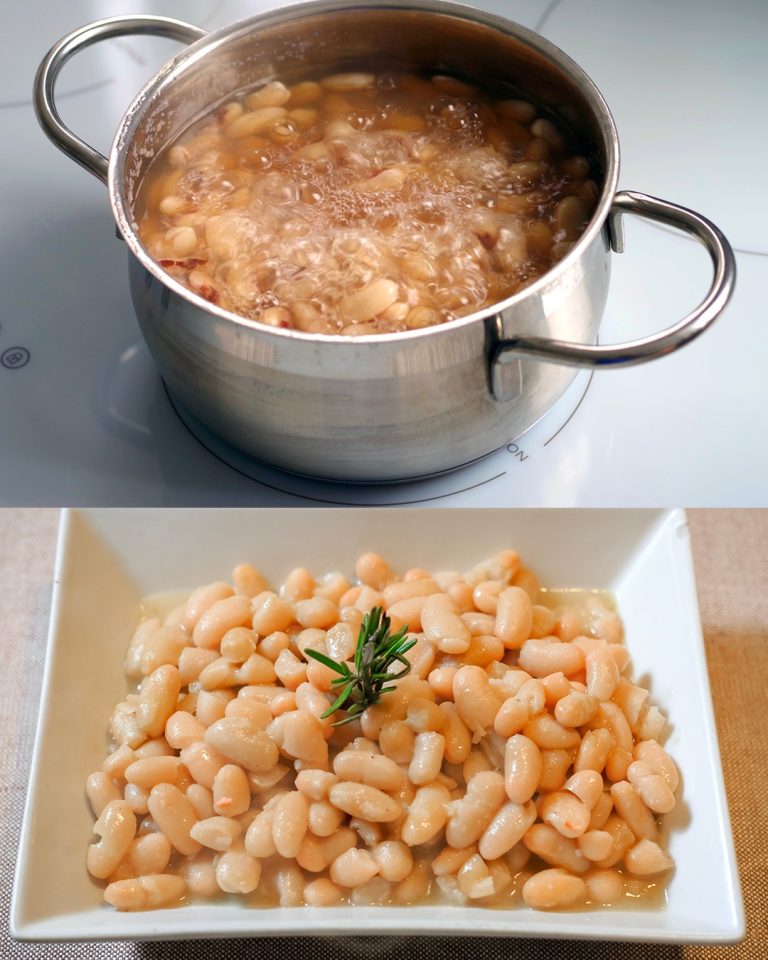ADVERTISEMENT
Cooking beans over too high heat can cause uneven cooking, with beans that remain hard inside as the surface flakes. Cooking beans takes time and patience.
How to avoid this error: Cook the beans over low or medium-low heat to prevent the temperature too high from ruining their consistency. Slow cooking allows the beans to soften evenly.
6. Do not test the cooking
Sometimes, beans may look like eye-cooked, but they may not be fully cooked yet. Another mistake is not to test the cooking of beans, which could lead to unpleasant results.
How to avoid this error: Check the cooking of the beans by tasting them during the process. Be careful not to cook them for too long, otherwise they will become too soft or break apart. Once they are soft but still intact, they are ready.
7. Do not use a suitable pot
The use of an unsuitable pot can compromise the cooking of beans. A pot too small, for example, may not allow a uniform distribution of heat and lead to a non-optimal cooking.
How to avoid this error: Use a pot large enough to hold beans and water so that they can cook evenly. A wide and bottom-up pot is ideal for slow and homogeneous cooking.
8. Not to respect the cooking time
Each type of bean has a different cooking time, which depends on the variety and freshness. Ignoring cooking times can lead to beans that are too hard or too soft.
How to avoid this error: Inquire about the cooking time specific to the variety of beans you are using. Generally, dried beans require between 1 and 2 hours of cooking, but also depends on the type of bean. Use a timer to avoid the risk of cooking them too much or too little.
Cooking beans to perfection requires attention and patience. Avoid these common mistakes, such as not letting the beans soaked, adding salt too early or cooking them too quickly, will help you get perfect, soft, and tasty beans every time. Following our advice, you can enjoy dishes based on beans with an authentic flavor and ideal consistency.Cooking beans seems easy, but often some common mistakes can compromise the end result. Find out what are the most frequent mistakes in cooking beans and how to avoid them to get perfect dishes each time.
Cooking beans seems simple, but errors can often occur that compromise the final result. Beans that are too hard, too soft or with an uninviting taste can be the result of an incorrect cooking. In this article, we will discover the most common mistakes in cooking beans and provide you with useful tips to get perfect beans each time.
1. Don’t let the beans soak
One of the most common mistakes in cooking beans is do not let them soak before cooking them. Dried beans contain a significant amount of starch that must be released before cooking, and soaking also helps to reduce cooking time.
How to avoid this mistake: Put the beans in a large bowl and cover them with cold water. Let them soak for at least 8 hours or during the night. If you have little time, you can opt for the fast method: bring the beans with water to a boil, turn off the heat and let them rest for 1-2 hours.
2. Don’t change the water after soaking
Another common mistake is not to change the water after soaking. During the soaking process, the beans release some substances that could make the dish less digestible or alter the flavor.
How to avoid this error: After soaking the beans, drain and rinse well under running water. Use fresh water for later cooking, to ensure greater digestibility and better flavor.
3. Add salt too early
Adding salt too early when cooking beans is an error that could compromise their consistency. Salt can stiffen the skin of the beans, making them more difficult to cook and preventing them from becoming soft.
How to avoid this error: Add salt only towards the end of cooking, preferably when the beans are already almost ready. This will ensure that the beans are soft and well cooked.
4. Do not use enough water
Do not add enough water while cooking the beans can have them stick to the bottom of the pot, compromising their cooking and causing the wrong texture.
How to avoid this error: Make sure that the beans are always completely covered with water during cooking. If necessary, add hot water during cooking to maintain the right level.
5. Cook the beans too fast
ADVERTISEMENT
